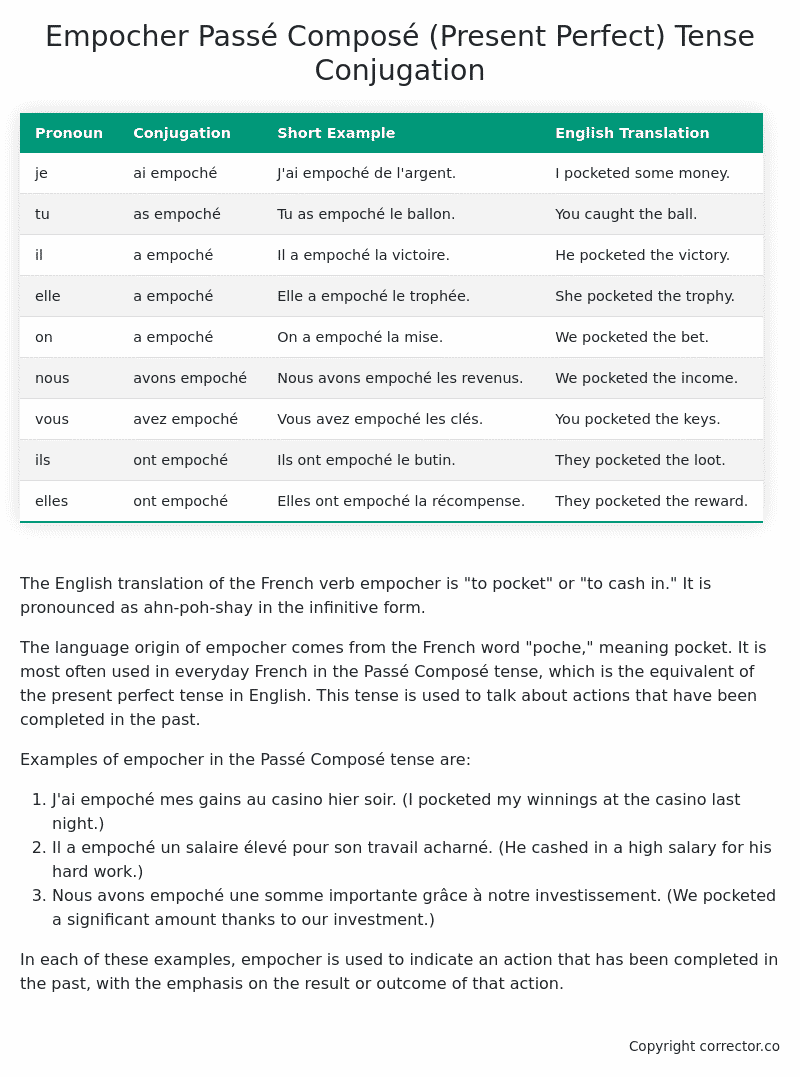Passé Composé (Present Perfect) Tense Conjugation of the French Verb empocher
Introduction to the verb empocher
The English translation of the French verb empocher is “to pocket” or “to cash in.” It is pronounced as ahn-poh-shay in the infinitive form.
The language origin of empocher comes from the French word “poche,” meaning pocket. It is most often used in everyday French in the Passé Composé tense, which is the equivalent of the present perfect tense in English. This tense is used to talk about actions that have been completed in the past.
Examples of empocher in the Passé Composé tense are:
- J’ai empoché mes gains au casino hier soir. (I pocketed my winnings at the casino last night.)
- Il a empoché un salaire élevé pour son travail acharné. (He cashed in a high salary for his hard work.)
- Nous avons empoché une somme importante grâce à notre investissement. (We pocketed a significant amount thanks to our investment.)
In each of these examples, empocher is used to indicate an action that has been completed in the past, with the emphasis on the result or outcome of that action.
Table of the Passé Composé (Present Perfect) Tense Conjugation of empocher
| Pronoun | Conjugation | Short Example | English Translation |
|---|---|---|---|
| je | ai empoché | J’ai empoché de l’argent. | I pocketed some money. |
| tu | as empoché | Tu as empoché le ballon. | You caught the ball. |
| il | a empoché | Il a empoché la victoire. | He pocketed the victory. |
| elle | a empoché | Elle a empoché le trophée. | She pocketed the trophy. |
| on | a empoché | On a empoché la mise. | We pocketed the bet. |
| nous | avons empoché | Nous avons empoché les revenus. | We pocketed the income. |
| vous | avez empoché | Vous avez empoché les clés. | You pocketed the keys. |
| ils | ont empoché | Ils ont empoché le butin. | They pocketed the loot. |
| elles | ont empoché | Elles ont empoché la récompense. | They pocketed the reward. |
Other Conjugations for Empocher.
Le Present (Present Tense) Conjugation of the French Verb empocher
Imparfait (Imperfect) Tense Conjugation of the French Verb empocher
Passé Simple (Simple Past) Tense Conjugation of the French Verb empocher
Passé Composé (Present Perfect) Tense Conjugation of the French Verb empocher (this article)
Futur Simple (Simple Future) Tense Conjugation of the French Verb empocher
Futur Proche (Near Future) Tense Conjugation of the French Verb empocher
Plus-que-parfait (Pluperfect) Tense Conjugation of the French Verb empocher
Passé Antérieur (Past Anterior) Tense Conjugation of the French Verb empocher
Futur Antérieur (Future Anterior) Tense Conjugation of the French Verb empocher
Subjonctif Présent (Subjunctive Present) Tense Conjugation of the French Verb empocher
Subjonctif Passé (Subjunctive Past) Tense Conjugation of the French Verb empocher
Subjonctif Imparfait (Subjunctive Imperfect) Tense Conjugation of the French Verb empocher
Subjonctif Plus-que-parfait (Subjunctive Pluperfect) Tense Conjugation of the French Verb empocher
Conditionnel Présent (Conditional Present) Tense Conjugation of the French Verb empocher
Conditionnel Passé (Conditional Past) Tense Conjugation of the French Verb empocher
L’impératif Présent (Imperative Present) Tense Conjugation of the French Verb empocher
L’infinitif Présent (Infinitive Present) Tense Conjugation of the French Verb empocher
Struggling with French verbs or the language in general? Why not use our free French Grammar Checker – no registration required!
Get a FREE Download Study Sheet of this Conjugation 🔥
Simply right click the image below, click “save image” and get your free reference for the empocher present perfect tense conjugation!

Empocher – About the French Passé Composé (Present Perfect) Tense
Formation of the Passé Composé
Set the auxiliary verb with either
Conjugate the auxiliary verb
Add the past participle
Common everyday usage patterns
Narrating Past Events
Sequential Actions
Describing Completed Actions
Interactions with other tenses
Imperfect Tense
Conditional and Future Tenses
Summary
I hope you enjoyed this article on the verb empocher. Still in a learning mood? Check out another TOTALLY random French verb conjugation!


